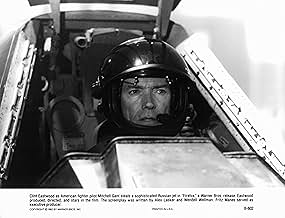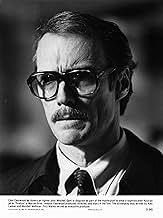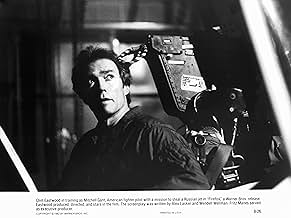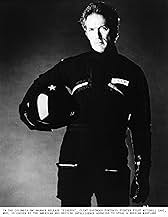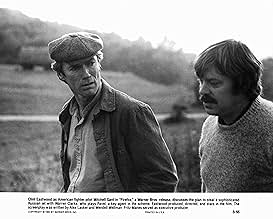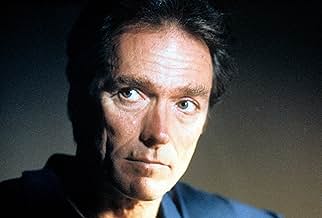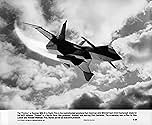Un pilote est envoyé en Union soviétique pour voler un prototype d'avion de combat à réaction qui peut être partiellement contrôlé par une liaison neuronale.Un pilote est envoyé en Union soviétique pour voler un prototype d'avion de combat à réaction qui peut être partiellement contrôlé par une liaison neuronale.Un pilote est envoyé en Union soviétique pour voler un prototype d'avion de combat à réaction qui peut être partiellement contrôlé par une liaison neuronale.
Klaus Löwitsch
- General Vladimirov
- (as Klaus Lowitsch)
Histoire
Le saviez-vous
- AnecdotesAuthor Craig Thomas' 1983 sequel to "Firefox", the novel "Firefox Down", is dedicated to Clint Eastwood. The dedication reads: "For Clint Eastwood - pilot of the Firefox".
- GaffesAfter the Firefox is stolen, General Vladimirov explains to the First Secretary that in order to maximize fuel range, Gant will have to control his speed and fly low to conserve fuel. The part about controlling his speed is true enough: speed, particularly with afterburners, is the enemy of fuel consumption, but flying low is exactly the opposite of what he should do. Airplanes - jets, in particular - burn far less fuel at higher altitudes where the air is thin than down low where it is much denser.
- Crédits fousThere are no opening credits after the title has been shown. This has since become a trademark of all Eastwood-directed films.
- Versions alternativesAfter its initial release, Clint Eastwood recut the film by 13 minutes; this 124-minute version has aired on cable TV. Full 137-minute original version restored for video and later network television releases.
- ConnexionsEdited from Destination: Zebra, station polaire (1968)
Commentaire à la une
Major Mitchell Gant an ex-Vietnam pilot who suffers from mentally scarred flashbacks and lives a life in solitary in the woods. He's asked back onto a mission, which involves sneaking into the USSR in many disguises. So that he can steal the Russia's new high-tech MIG-31 fighter plane called the "Firefox", which its weaponry works on mind control. Since his America's best pilot, naturally his their first choice to get the plane and fly it back to western soil.
I read a lot complaints against Eastwood's pacing being quite sluggish and can't help but agree. Although the final half of the film might get all the applause with its visual effects and fast-paced action thrills. But actually, I got more out of the atmospherically brooding old hat spy set-up involving Eastwood's character travelling around Vienna (masquerading very effectively as Moscow) to get to the MIG-31. After getting to the jet, it simply falls into the unremarkable bracket and the visual gimmicks come off junky looking and lack any real spark despite the rapid build-up. When it comes to the end, it feels sudden and unfulfilling. Eastwood is pretty dry, but convincing nonetheless as Major Mitchell Gant (since he can get along alone by his magnetic screen presence) and he tackles the director's chair with sharply tight, but practically no-frills direction. The pacing throughout does seem to flounder, but Eastwood creates some moody scenes with gloomy lighting (plenty of nocturnal shots) and Bruce Surtees' burnished photography is splendidly framed to achieve an atmospheric air of growing paranoia. Maurice Jarre's vividly classy music score is titillatingly on the spot. Eastwood deliberately soaks up the bleakly audacious cold war story (adapted off Craig Thomas' 1977 novel) with an array of twists, alienation and minor suspense chipped out of Alex Lasker's hauntingly calculated, but choppy screenplay. Two weak points though, would be there's not much focus and some coincidences are hard to digest. Why I say minor in the tension, is because the suspense doesn't last real long and by being overlong it becomes too relaxed in its own high-strung set-up. The productive script is highly talkative and filled with political jargon, but settles in with some warm moments to share a bit light on the characters. The supporting cast are all capably solid with the likes of Freddie Jones, David Huffman, Warren Clarke, Kenneth Colley and Stefan Schnabel. The glazed up special effects by John Dykstra (who won an Oscar for his work on "Star Wars (1977)") might be mesmerizing and refreshing, but they are far from impressive with one or two arresting sequences executed in between many clumsy takes.
"Firefox" is nothing particularly exciting and far from a success, but I found it strangely captivating and a handsome looking feature. The idea just doesn't entirely translate on this occasion.
I read a lot complaints against Eastwood's pacing being quite sluggish and can't help but agree. Although the final half of the film might get all the applause with its visual effects and fast-paced action thrills. But actually, I got more out of the atmospherically brooding old hat spy set-up involving Eastwood's character travelling around Vienna (masquerading very effectively as Moscow) to get to the MIG-31. After getting to the jet, it simply falls into the unremarkable bracket and the visual gimmicks come off junky looking and lack any real spark despite the rapid build-up. When it comes to the end, it feels sudden and unfulfilling. Eastwood is pretty dry, but convincing nonetheless as Major Mitchell Gant (since he can get along alone by his magnetic screen presence) and he tackles the director's chair with sharply tight, but practically no-frills direction. The pacing throughout does seem to flounder, but Eastwood creates some moody scenes with gloomy lighting (plenty of nocturnal shots) and Bruce Surtees' burnished photography is splendidly framed to achieve an atmospheric air of growing paranoia. Maurice Jarre's vividly classy music score is titillatingly on the spot. Eastwood deliberately soaks up the bleakly audacious cold war story (adapted off Craig Thomas' 1977 novel) with an array of twists, alienation and minor suspense chipped out of Alex Lasker's hauntingly calculated, but choppy screenplay. Two weak points though, would be there's not much focus and some coincidences are hard to digest. Why I say minor in the tension, is because the suspense doesn't last real long and by being overlong it becomes too relaxed in its own high-strung set-up. The productive script is highly talkative and filled with political jargon, but settles in with some warm moments to share a bit light on the characters. The supporting cast are all capably solid with the likes of Freddie Jones, David Huffman, Warren Clarke, Kenneth Colley and Stefan Schnabel. The glazed up special effects by John Dykstra (who won an Oscar for his work on "Star Wars (1977)") might be mesmerizing and refreshing, but they are far from impressive with one or two arresting sequences executed in between many clumsy takes.
"Firefox" is nothing particularly exciting and far from a success, but I found it strangely captivating and a handsome looking feature. The idea just doesn't entirely translate on this occasion.
- lost-in-limbo
- 3 mars 2007
- Permalien
Meilleurs choix
Connectez-vous pour évaluer et suivre la liste de favoris afin de recevoir des recommandations personnalisées
Détails
Box-office
- Budget
- 21 000 000 $US (estimé)
- Montant brut aux États-Unis et au Canada
- 46 708 276 $US
- Week-end de sortie aux États-Unis et au Canada
- 8 152 948 $US
- 20 juin 1982
- Montant brut mondial
- 46 708 276 $US
- Durée2 heures 16 minutes
- Couleur
- Rapport de forme
- 2.39 : 1
Contribuer à cette page
Suggérer une modification ou ajouter du contenu manquant

Lacune principale
By what name was Firefox : L'Arme absolue (1982) officially released in India in Hindi?
Répondre

